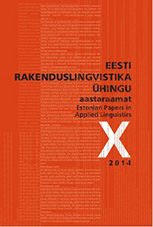Tõhususe tahud sõjandusterminoloogia näitel: ülediferentsimine või erinev tunnetusväärtus?
ASPECTS OF SPECIALISED LANGUAGE EFFICIENCY: OVER-DIFFERENTIATION OR COGNITIVE MOTIVATION?
Author(s): Reet HendriksonSubject(s): Language and Literature Studies
Published by: Eesti Rakenduslingvistika Ühing (ERÜ)
Keywords: military terminology; LSP planning; (over)differentiation of term variants; cognitive motivation; Estonian
Summary/Abstract: This article addresses terminological (over)differentiation based on military terminology. The aim of the article is to discuss the boundary between over-differentiaton and cognitively motivated term variants whose function is to ensure accurate specialised communication. The traditional view states that the functionality and unambiguity of SL (specialised language) is guaranteed by invariability of terms (established standards) and thus “unnecessary” term variants are rejected. There are a number of other LSP (language for special purposes) topics directly associated with differentiation (e.g. synonymy, polysemy, internal loans, conceptual hotchpotch). My study has shown that officers’ opinions about the necessity of differentiation vary considerably, blurring the boundaries between differentiation and over-differentiation. The changes in conceptual relations over time and the impact of sociocultural factors (e.g. power relations) both add complexity to the issue. The role of a donor language is ambivalent too: although interference is largely deprecated, in the case of complex relationships between terms, reduction to the source language often serves as a key for specialists for identifying concepts. This study suggests that attempts towards terminology harmonisation may cause even more confusion at first stage. As current results indicate it is not functional to define generally established rules when aiming to find boundaries between differentiation and over-differentiation. Instead, we need to ask which aspects of each specific case to consider. Further research is needed to investigate the real impact of term variations in the field.
Journal: Eesti Rakenduslingvistika Ühingu aastaraamat
- Issue Year: 2014
- Issue No: 10
- Page Range: 107-123
- Page Count: 17
- Language: Estonian

